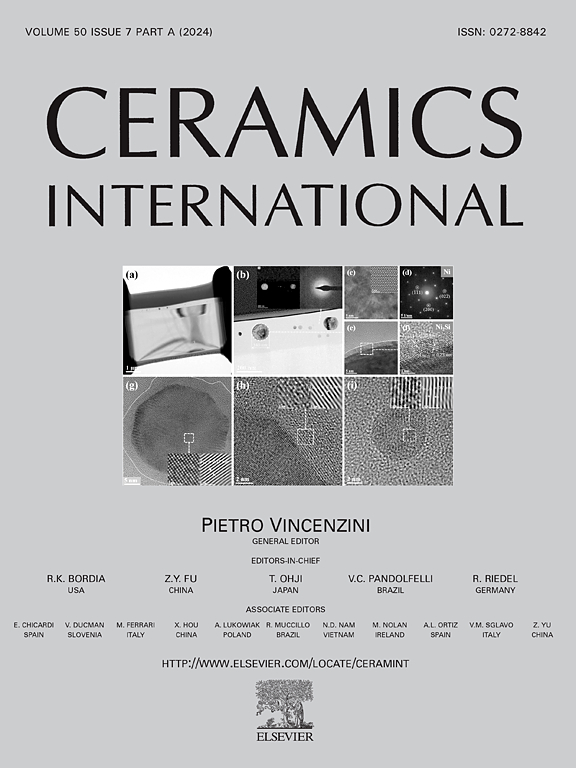Construction of novel dual wave-absorbing ZnFe2O4/CNTs nanoparticles with more hotspots for enhanced microwave-induced catalytic activity:Performance and mechanism
IF 5.1
2区 材料科学
Q1 MATERIALS SCIENCE, CERAMICS
引用次数: 0
Abstract
In this study, novel dual wave-absorbing ZnFe2O4/CNTs nanoparticles were successfully fabricated using a microwave hydrothermal method and applied for enhanced microwave-induced catalytic degradation of bisphenol A (BPA) in aqueous solution. The effects of various process parameters, including Fe3+ concentration (mass ratio of ZnFe2O4 to CNTs), MW irradiation time, MW power, initial BPA concentration, and catalyst dose on the degradation process were thoroughly assessed. The results indicate that ZnFe2O4/CNTs nanoparticles effectively utilize MW energy to generate more hot spots and exhibit superior MW catalytic activity at a 1.0:10.0 mass ratio (ZnFe2O4:CNTs), due to the synergistic effect between ZnFe2O4 nanoparticles and CNTs under MW irradiation. Additionally, hydroxyl radicals (·OH) play a major role in the degradation process, while superoxide radicals (·O2−) and holes (h+) play relatively minor roles. Potential intermediates and degradation pathways in the ZnFe2O4/CNTs/MW system have also been identified. Thus, the integrated ZnFe2O4/CNTs/MW technology shows great promise for treating environmental endocrine disruptors (EEDs) in water and wastewater.
构建具有更多热点的新型 ZnFe2O4/CNTs 双吸波纳米粒子,增强微波诱导催化活性:性能与机理
本研究采用微波水热法成功制备了新型双吸波 ZnFe2O4/CNTs 纳米粒子,并将其用于增强微波诱导催化降解水溶液中的双酚 A(BPA)。研究深入评估了各种工艺参数,包括 Fe3+ 浓度(ZnFe2O4 与 CNTs 的质量比)、微波辐照时间、微波功率、初始双酚 A 浓度和催化剂剂量对降解过程的影响。结果表明,当 ZnFe2O4 与 CNTs 的质量比(ZnFe2O4:CNTs)为 1.0:10.0 时,ZnFe2O4/CNTs 纳米颗粒能有效地利用 MW 能量产生更多的热点,并表现出更高的 MW 催化活性,这是由于 ZnFe2O4 纳米颗粒和 CNTs 在 MW 辐照下产生了协同效应。此外,羟基自由基(-OH)在降解过程中起主要作用,而超氧自由基(-O2-)和空穴(h+)的作用相对较小。此外,还确定了 ZnFe2O4/CNTs/MW 系统中的潜在中间产物和降解途径。因此,ZnFe2O4/CNTs/MW 集成技术在处理水和废水中的环境内分泌干扰物 (EED) 方面大有可为。
本文章由计算机程序翻译,如有差异,请以英文原文为准。
求助全文
约1分钟内获得全文
求助全文
来源期刊

Ceramics International
工程技术-材料科学:硅酸盐
CiteScore
9.40
自引率
15.40%
发文量
4558
审稿时长
25 days
期刊介绍:
Ceramics International covers the science of advanced ceramic materials. The journal encourages contributions that demonstrate how an understanding of the basic chemical and physical phenomena may direct materials design and stimulate ideas for new or improved processing techniques, in order to obtain materials with desired structural features and properties.
Ceramics International covers oxide and non-oxide ceramics, functional glasses, glass ceramics, amorphous inorganic non-metallic materials (and their combinations with metal and organic materials), in the form of particulates, dense or porous bodies, thin/thick films and laminated, graded and composite structures. Process related topics such as ceramic-ceramic joints or joining ceramics with dissimilar materials, as well as surface finishing and conditioning are also covered. Besides traditional processing techniques, manufacturing routes of interest include innovative procedures benefiting from externally applied stresses, electromagnetic fields and energetic beams, as well as top-down and self-assembly nanotechnology approaches. In addition, the journal welcomes submissions on bio-inspired and bio-enabled materials designs, experimentally validated multi scale modelling and simulation for materials design, and the use of the most advanced chemical and physical characterization techniques of structure, properties and behaviour.
Technologically relevant low-dimensional systems are a particular focus of Ceramics International. These include 0, 1 and 2-D nanomaterials (also covering CNTs, graphene and related materials, and diamond-like carbons), their nanocomposites, as well as nano-hybrids and hierarchical multifunctional nanostructures that might integrate molecular, biological and electronic components.
 求助内容:
求助内容: 应助结果提醒方式:
应助结果提醒方式:


